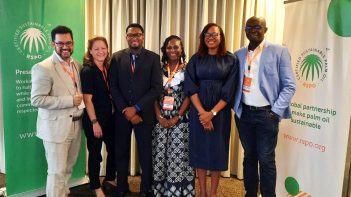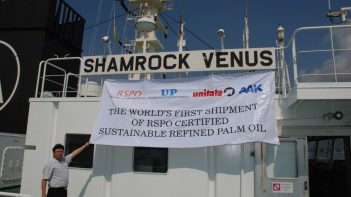Achieving RSPO certification has been a lengthy but satisfying journey for Twifo Oil Palm Plantations Ltd (TOPP) in Ghana, which initiated the certification process in 2011. We spoke with TOPP RSPO Coordinator Kwame Acheampong about the company’s journey to certification, challenges faced along the way, and their commitment to producing certified sustainable palm oil in Ghana.
Kwame explained that TOPP is managed by Unilever, who supported them throughout the certification process. RSPO certification is part of Unilever’s corporate commitment to sustainably source all palm oil by 2019. With Unilever’s backing, TOPP began the certification process with an RSPO Baseline Assessment audit by PROFOREST in 2011. This revealed a number of major and minor compliance issues, so an internal management team of seven ‘RSPO Champions’ was established to spearhead certification efforts. To support them, TOPP and Unilever sponsored the RSPO Champions to attend RSPO Lead Auditor courses. They then drew up a detailed action plan to address the issues raised and used mock audits to monitor progress and update the plan as needed.
Overcoming challenges
As with any new process, Kwame explained that changing habits and routines was one of the biggest challenges. “During the early stages, we needed continuous training and stakeholder engagement, as not everyone in our workforce or the surrounding communities fully understood the new ways of working, especially in buffer zones and conservation areas,” he said.
“We also had to put in a lot of effort to meet the certification requirements, such as the mandatory High Conservation Value (HCV) and Social Impact Assessment (SIA),” Kwame shared. One particularly challenging gap to close was related to a successful smallholder project, the Buabin Outgrower Scheme. “This has been a great success for farmers but when we set it up in 2007, HCV assessments were not standard practice,” explained Kwame; “but we were able to work with PROFOREST and farmers for over three months to implement a Remediation and Compensation Procedure (RaCP) to address any potential HCV losses.”
Next steps for TOPP after obtaining RSPO certification
TOPP’s efforts, with Unilever’s support, paid off when the company achieved certification in November 2017. This is a huge accomplishment for the company and the RSPO Champions who led the process. “We are extremely grateful for the backing of Unilever, who helped us obtain technical assistance from PROFOREST and the Solidaridad Network for training, capacity building, and surveillance audits, as well as for the support given to us by Tettey & Associates and the Council for Scientific and Industrial Research – Ghana Soil Research Institute” said Kwame.
Since achieving certification, TOPP continues to work to improve operations. Kwame also noted that the Corporate Social Responsibility policy and SIA – which TOPP completed as a requirement for certification – have helped them enhance community relations, creating a more positive and harmonious dynamic between the company and local people.
RSPO congratulates TOPP on their persistence and achievement.
Keep reading
Call for Proposal: Study on Wild Palms in West and Central Africa

RSPO hosts first Africa downstream sustainable palm oil supply chain forum in Cape Town

Nearly two decades on, Europe continues to drive global demand for RSPO Certified Palm Oil

Communicating Sustainable Palm Oil - examples of success across Europe
[EOT] Terms of Reference: Independent Smallholders Outreach Programme in Indonesia

RT2023 Delegates Propose Solutions to Reinforce RSPO’s Assurance System – End-Year Highlights of Assurance Standing Committee
RSPO UK Members' Day Examines Shifting Dynamics of Doing Business within Europe

Celebrating 20 Years of RSPO’s Sustainability Journey




